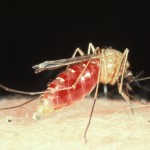 The year 2012 is turning out to be one of the worst years in north Texas for West Nile virus since the disease crept into the state in the late 1990s. As of last Friday, there were 115 total human cases of West Nile virus (fever and neuroinvasive forms included) in Dallas County alone. And the summer, and peak WNV season, is far from over.
The year 2012 is turning out to be one of the worst years in north Texas for West Nile virus since the disease crept into the state in the late 1990s. As of last Friday, there were 115 total human cases of West Nile virus (fever and neuroinvasive forms included) in Dallas County alone. And the summer, and peak WNV season, is far from over.
Do-it-yourself Options
There are several simple things everyone can do to fight back against mosquitoes.
When going outdoors, using a personal repellent remains your’s and your family’s primary, and most secure, line of defense. My summer intern, Jeremy Farmer, wrote on this subject a few weeks ago, so if you didn’t catch that post, check it out. But many of us get caught without repellent when stepping outside for a short trip to retrieve the mail or newspaper. Also, health department officials note that indoor mosquitoes may be another source of bites in some WNV cases.
So besides repellents, what can you do to reduce the risk of mosquito bites for yourself and your family in your backyard and indoors? It turns out that there are several relatively inexpensive steps anyone can take to reduce mosquito risks around the home.
Look for standing water in and around your backyard. Before you dismiss this as something YOU don’t have to worry about in YOUR backyard, go outside and take a hard look. If you or your neighbors are washing the car or running irrigation systems, there is always possibility of standing water in small containers, drainage catchment basins, and city storm drains next to your home. Also, check overflow dishes in potted plants and neglected bird baths. After summer showers make sure that buckets, wheelbarrows and children’s toys are emptied. It only takes a little soil, compost or a few leaves, and water that stands for 1-2 weeks, to breed mosquitoes.
Drain or treat standing water. Standing water in sewer lines or catchment basins can be treated with mosquito dunks or an insect growth regulator called methoprene. Methoprene granules or briquets last the longest, but both products will kill mosquito larvae when you can’t drain the water from a breeding hole. Remember, koi ponds, streams or creeks with fish generally don’t need treatments–fish do a pretty good job in most cases of controlling pest mosquitoes.
Ridding your yard of breeding sites is not the full answer, because mosquitoes will disperse into your yard from neighboring properties. Use an aerosol or propane fogger to clear mosquitoes temporarily from a yard. Having a picnic this weekend? One of the short-lived insecticides like pyrethrins or resmethrin can be applied to shrubbery, tree foliage and shady areas around the home to kill resting mosquitoes. Effects of such sprays can last for a few hours to a couple of days.
Use your garden sprayer to apply pyrethroid sprays to treat shady areas around the house, especially around entryways where resting mosquitoes are more likely to come indoors when you enter and leave the home. Sprays like lambda-cyhalothrin, cyfluthrin and others can provide several weeks of mosquito killing power on soffits and wood siding. Applications made to brick are a little tricky and may need to be reapplied more frequently.
If you are ready for more drastic action, several manufacturers make hose-applied pyrethroid insecticides for general backyard insect control. While I’m not generally a fan of broadcast applications of insecticides to the backyard (because of possible effects on beneficial insects), these products can provide extended control of disease-carrying mosquitoes. Sprays should be applied to shady lawns, shrubs, trees and shady areas of the house exterior where mosquitoes hide during the day.
Note: Pyrethroid insecticides are very effective at mosquito control, but should be used carefully. Only use during the peak time for disease risk (July-September in most areas of Texas), and follow all directions on the label carefully. To minimize the risk of these products to butterflies and honey bees, apply in the evening just before dark. And don’t apply pyrethroids on windy days or when rain is expected. To learn more about using pyrethroids safely, click here.
Hiring a Professional
If the thought of do-yourself-bug battling isn’t for you, consider using a professional. Many pest control companies in metropolitan areas offer mosquito control services. A professional can offer applications and pesticide formulations that reach higher into trees (where WNV mosquitoes hide) and work better on porous surfaces like brick. This may be the best alternative for many of us.
Ask about the various options offered by the company. Mister systems are more expensive, and require constant attention to minimize the impacts of the sprays on beneficial insects. They should only be used when mosquito season is at its peak. Residual treatment of plants and outdoor surfaces is generally effective for 4-6 weeks, and more economical than mister system installation.
Finally
If this post seems a little more insecticide-oriented than usual, there’s a reason. Mosquitoes, especially this summer, are serious business. Despite care to rid my own yard of all possible breeding sites, the mosquitoes in my, and my neighbors’, yards have been abundant this year. This summer I’m diligent (more than usual) about using repellent whenever I go outside, even for a few minutes, and I’m ready to use longer-lasting insecticides in my (normally insect-rich) back yard. One thing’s for sure. The beneficial insects will return to my yard after mosquito season. I want to be around to enjoy them.

 .
.